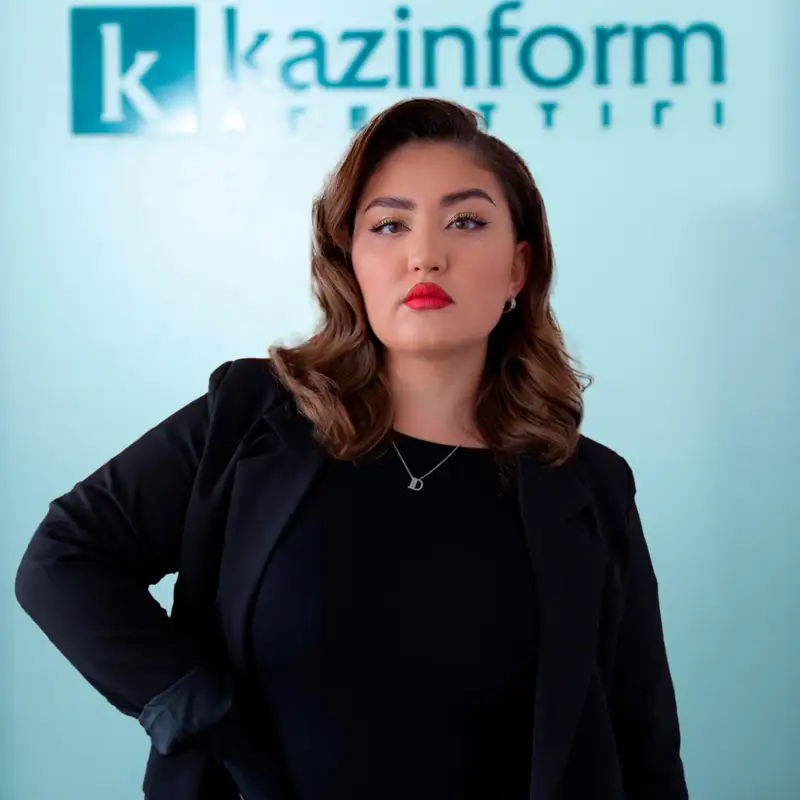Central Asia, by its very name, is central: EU Special Representative Eduards Stiprais on connectivity, cooperation, and future prospects
As the EU-Central Asia Summit is set to be held today in Samarkand, EU Special Representative for Central Asia Eduards Stiprais shared his insights in an exclusive interview with Kazinform News Agency on regional cooperation, economic growth, and key trade developments. He also highlighted the political significance of the summit and the expanding role of cooperation between the regions.
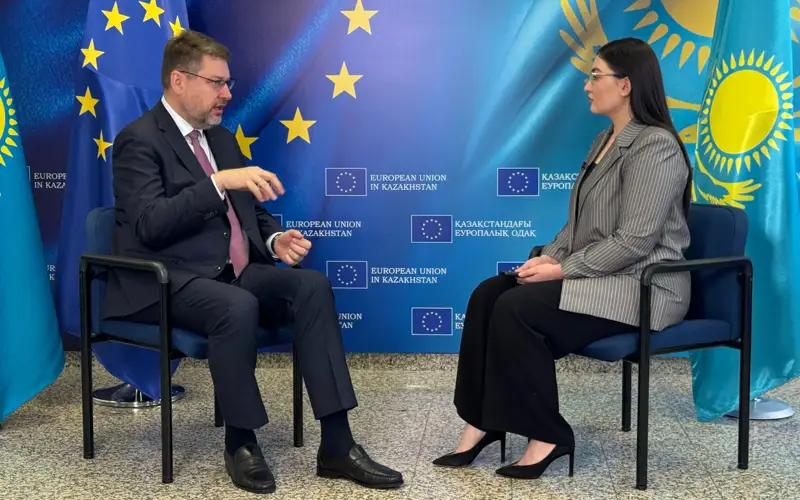
The EU–Central Asia Summit will take place in Samarkand in April [Ed. note: today]. Can you provide more details on what will be discussed? What is the political significance of this summit?
– I think the summit, which will take place on the 3rd and 4th of April, is extremely important because that would be the first summit where all five Central Asian leaders will meet also with the leadership of the European Union, the President of the [European] Council, and the President of the [European] Commission, and this is something that we see as the partnership in areas that are of common interest to both regions because we look at Central Asia as an important partner, both in economic development and also in political dialogue.
And of course, Central Asia, by its very name, is central. It's in the center of our continent, and it provides us with connectivity, either East-West or North-South. This is something that discussions in Samarkand will be focused on: connectivity, cooperation on critical raw materials, cooperation in areas related to environment, water, climate change, and, of course, security situation in our immediate vicinity. Things are that we are going to discuss and set actually sort of the roadmap for the future work together.
How is cooperation developing among Central Asian countries within the CSTO, SCO, and other regional organizations?
– I think for us the most important thing is that there is a greater degree of internal cooperation and integration within the Central Asia. There we see very good developments in recent years. Now with regular consultative meetings of the leaders, I understand that there are several levels of those meetings at the various levels, ministerial and expert levels, and so on, discussing issues of common interest to the countries of Central Asia. I think this is extremely important.
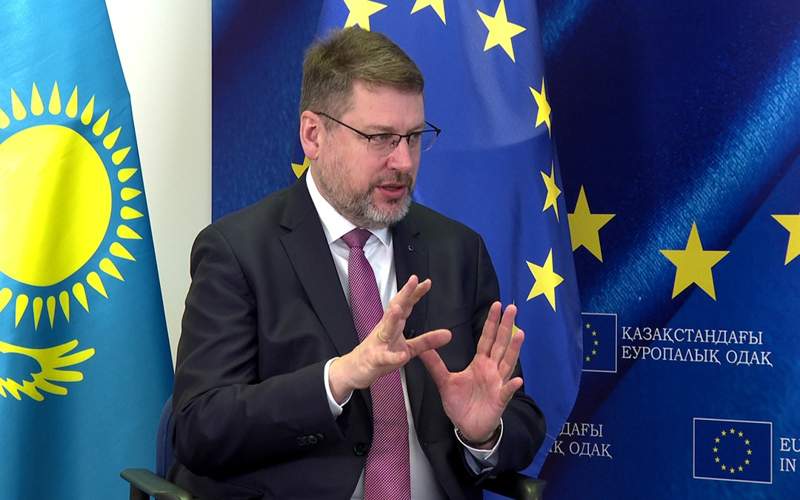
Another thing is that, of course, there are various international fora in which we do participate, either the European Union or the Central Asian countries. It's really for your countries to decide in which fora they find that those goals that they are setting for themselves help them the most.
We know countries, not all of the countries, they belong to various organizations; some of them are full members, others are observers. I think this is something that really each and every country decides for itself. And of course, there are very important international fora where we are presented together, like the United Nations or the OSCE.
I think there we can interact and work together, actually, to achieve our common goals, including issues like actually preserving and maintaining the rules-based international order.
Next question regarding economics. What European investment projects are currently being implemented in Central Asia?
– Probably I should start by explaining that European investment projects are two completely different things. I mean, the one is what the European Union as an organization is doing here, going through our cooperation programs with the countries of the region, actually supporting economic development, social development, and issues related to common interests like water, climate, and the environment. And also, actually, connectivity, something which is extremely important where, for example, the European Union has dedicated a Global Gateway program with up to 550 million euros available for this support [Ed.note - for all purposes].
But of course, investments as such into the economy, into companies, and into creating jobs—this is something which is done by the private economic operators. Here I think the important thing is that in general, we are the second trading partner to Central Asia. I think that if I'm not mistaken, something like 40% of all the foreign direct investments in the region are coming from Europe.
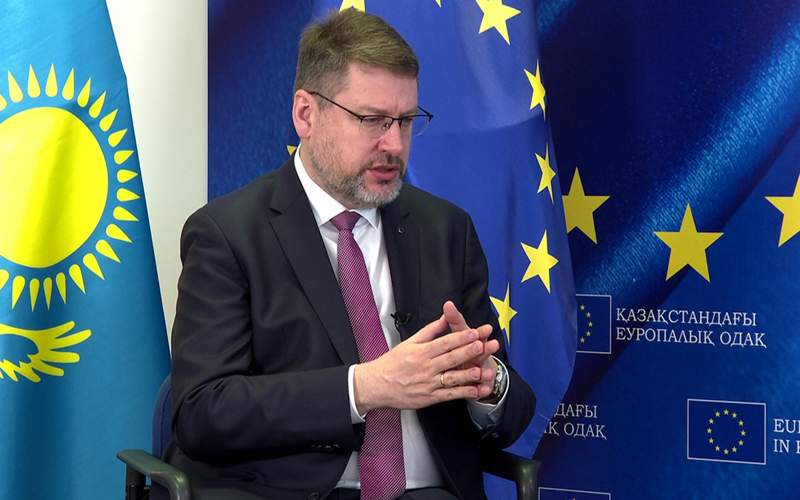
We are both present here as private investors in many very important areas of the economy, but also as the European Union supporting economic development and actually increasing connectivity between our two regions, because, frankly speaking, it's not enough to produce some goods; you need external markets; you need to deliver those goods to external markets. And if we want to develop bilateral trade, it's extremely important that we have those trading routes open, existing, and developed so that those goods could move between two of our regions.
Building more on that topic. Which sectors of the Central Asian economy are currently the most attractive for European and international investors?
– I probably wouldn't sort of invent a wheel by saying that currently probably the most important sector would be critical raw materials, because both the European Union and its member states, but also globally, if we want to achieve those climate change targets, which means our transition to a greener economy, and there are commitments which are undertaken by the European Union, there are commitments which are undertaken by the Central Asian countries, including Kazakhstan. Very ambitious targets, I must say, and we are very grateful for that because this is a global problem, and we must tackle it together.
For that, we need this green transition towards renewable energy. That means we need a panoply of various raw materials, mostly metals, to enable us to produce more batteries, to produce more electricity-generating equipment, like solar panels, like wind turbines, and others. We need copper to actually lay cables to connect generating capacities with consumers. So, I would say this is what oil was for the 20th century. For the 21st century, I would say this what we call the critical raw materials is the new most important area where we see that we need to achieve our green transition.
What are the current prospects for expanding economic cooperation between Central Asia and the EU aside raw materials?
– I think there is probably not enough potential, which exists here in Central Asia, discovered also from the European side. Frankly speaking, for decades, both investors from Europe and European consumers were looking at some other producers. I mean, the big ones like China, just east of you, Southeast Asia, and others to source many goods. Here, Central Asia has enormous potential for producing those goods. You have an available workforce and actually rather qualified, I must say, a well-educated workforce here in Central Asia. You have raw materials, both ones that you could extract from the earth and others that you could grow here. It's both for industrial products and textiles, but also for the foodstuff. There are things that can and should penetrate European markets. And European consumers must have the possibility to enjoy things that you have here.
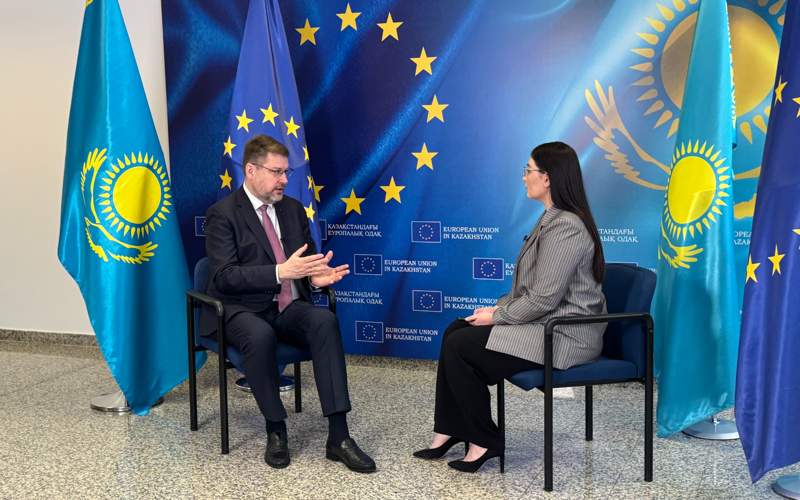
One of the sectors that we haven’t talked about is technology. Kazakhstan is rapidly developing its AI sector. Does the EU have programs to support startups and innovative technologies in Central Asia?
– Indeed. Startups are extremely important in a way that they can achieve the breakthrough where sometimes those already established companies and large companies would hesitate to risk. We need young and ambitious people going to business and actually willing to risk, not being afraid to risk, and to bring in some inventions. I mean, there is no specific program focused only on startups, but we have programs which are focused on the support of small and medium-sized enterprises.
And frankly speaking, in many cases, startups are either small or, in some cases, even microenterprises. They can fully use those facilities, which are already available in Central Asian countries. Probably they need more information about the availability of these funds if necessary or, training, or other support. We are not investing money, per se. This is rather the area for the private risk funds and equity funds for them. I think that they, I mean, since markets in the United States and markets in Europe are getting somehow more saturated, those venture capitalists are looking elsewhere. I think Central Asia in this respect has an enormous untapped potential. What you need is a little bit of marketing.
We briefly talked about food and food processing in general. It was recently announced that Kazakhstan will export honey to the EU. Does the EU plan to support Kazakh producers in certifying their products according to European standards? Is the EU considering providing technical or financial assistance to Kazakh beekeepers in that regard?
– First and foremost, I must congratulate Kazakhstan on actually securing this access to the European market for the honey. One thing is, and which is very important, and this is that it's not that we are doing some specific favor. No. It's just that everybody can access the European market, provided that they actually satisfy sometimes very stringent health and safety rules, especially for those products which are of animal origin. Honey, but also for meat and dairy products, and I must say that Kazakhstan, and we are not only importing from Kazakhstan, but also the widely-caught fish products. I know that Kazakhstan now wants to expand into aquaculture products, also looking beyond that to meat and dairy.
The European Union is providing assistance in terms of actually providing necessary training, providing necessary documentation to the Kazakh authorities, and controlling authorities because the most important thing is that those are your own veterinary services, veterinary controls, which are actually overlooked and that the system is reliable. And then, of course, necessary training to beekeepers, but also to other agricultural producers, so that they know what those things are that they must follow. For example, to avoid that honey is contaminated by various pollutants, which could be like agricultural chemicals, which could be the fallout from the industrial pollution
We are providing sometimes support not to individual farmers but to farmers' organizations in those Central Asian countries that are, frankly speaking, in economic development not as developed as Kazakhstan, because, for example, they are also profiting from the preferential system of the access to the tariff system, the access to the European Union, exactly because this is sort of the development assistance. In Kazakhstan, I think those producers are able to actually obtain those funds also locally. I think there is an opportunity. We are ready, and we are already providing, when requested, technical assistance. I'm very optimistic about the availability of Kazakh products on European shelves in the coming years.
Will any other Kazakh products be exported to the EU? Are there any preliminary agreements on this?
– This is for the private operators. I'm not aware, but actually I’ve seen also in Europe, for example, Kazakh melons. It's just one example, which means that whatever you are producing, provided that producers are following some rules, you can export it to the European market. And again, what might be sometimes necessary is a little bit of marketing.
Then, of course, we must think, because of the existing distances, what is worthwhile to transport over such a distance. Because the transport costs, of course, also will impact the competitiveness of your produce, specifically speaking about the agricultural one. There is one product, a commodity, which has been on the European market for a number of years, if not for decades. And of course, this is Kazakh grain, that is something that is there. I know that some vegetable oils produced here are available in Europe. It's just a matter, if that makes economic sense for Kazakh exporters to send their goods to Europe. Because of the distance, because of the price, I think all those products are welcome. It's just for the economic operators to decide what makes sense for them.
One of the key areas of cooperation between our regions is transitioning to green energy. How do you assess the prospects for nuclear energy development in the region, for example, Kazakhstan's plans to build its first nuclear power plant?
– I think the most important thing of all is really to stick to our commitments for climate change to minimize its impact on our everyday life, and I think over recent years we’ve witnessed how climate change is haunting us, even those who don't believe it. It doesn't always mean that you would have hotter summers and warmer winters. I would say rather what we have because of climate change is we have more of the extreme weather conditions arriving more and more often, like last year's floods here in Kazakhstan, but also in Europe, where we have those periods of extreme heat and dryness and then suddenly those torrential rains, which are creating floods.
I think the most important is really to have this green transition for which, I mean, one of the technologically simplest ways is renewable energy. But of course, that requires some upfront investments.
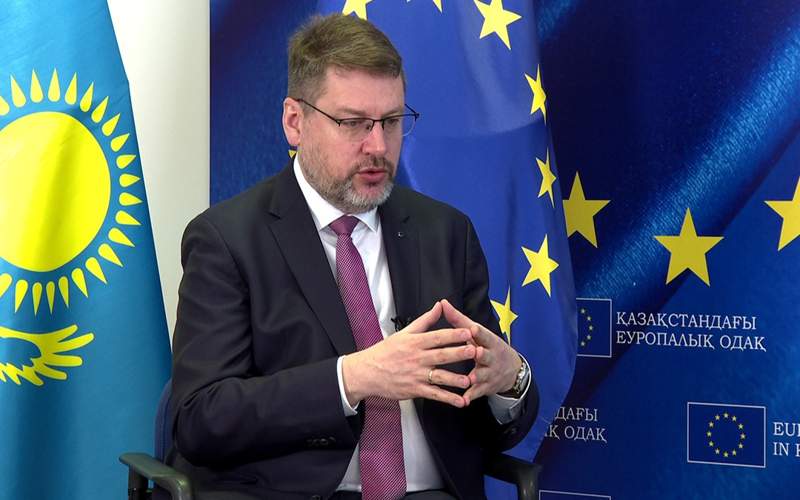
On nuclear, I must say it does exist in Europe. Frankly speaking, there is no joint opinion of the European Union as an organization, because each and every member state decides by itself either to have it or not to have it. There are countries, like, for example, France, which rely very heavily on nuclear energy. There are countries that are prohibiting the use of nuclear energy in their energy mix. It's up to each and every country to decide.
What the European Union is focusing on as the union, as an organization, is nuclear safety. Because for us, nuclear safety, the safe handling of nuclear materials, either as a fuel or spent fuel, and technological processes that are used, safeguard measures are of utmost importance because we are still living in Europe, but not only Europe, but I think also in other parts of the world, with the consequences of the Chernobyl disaster in 1986. Everybody just remembers Fukushima more recently.
We would say the most important thing is safety. We are not against nuclear energy. I mean, many of our countries are very successfully using it and even building new reactors. Of course, with the new generation of reactors, they are much safer than the old ones. I think nuclear energy has its place, but it's for each and every country to decide to what extent to use it.
In your opinion, what does the future hold for the cooperation between our regions?
– I see a very bright future. Because our cooperation is not something artificial, you first think, “OK, you need it for symbolic purposes or whatsoever, because then it would be sort of languishing.” I mean, here we have enormous mutual interest to work together, and I think with Central Asia as a region, with each and every country, I think the European Union has very good cooperation. And with the region itself more asserting itself as a region in various ways, it's going to be even more fruitful. We see enormous potential in the internal integration of Central Asia, looking at our own example. I mean, the European Union, it started as a coal and steel community more than 70 years ago, and now it's evolved in one of the strongest economic but also political blocs in the world. So, I can only wish the same success to Central Asia.
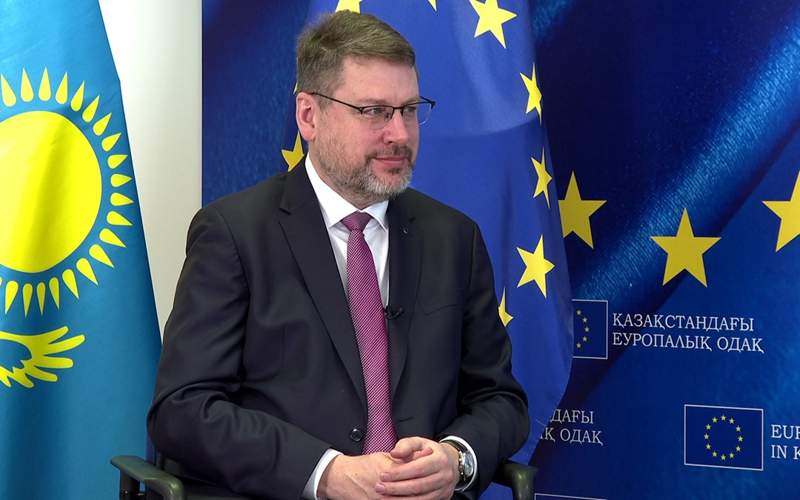
Earlier, Kazinform News Agency correspondent explored why the European Union is strengthening ties with Central Asia.
